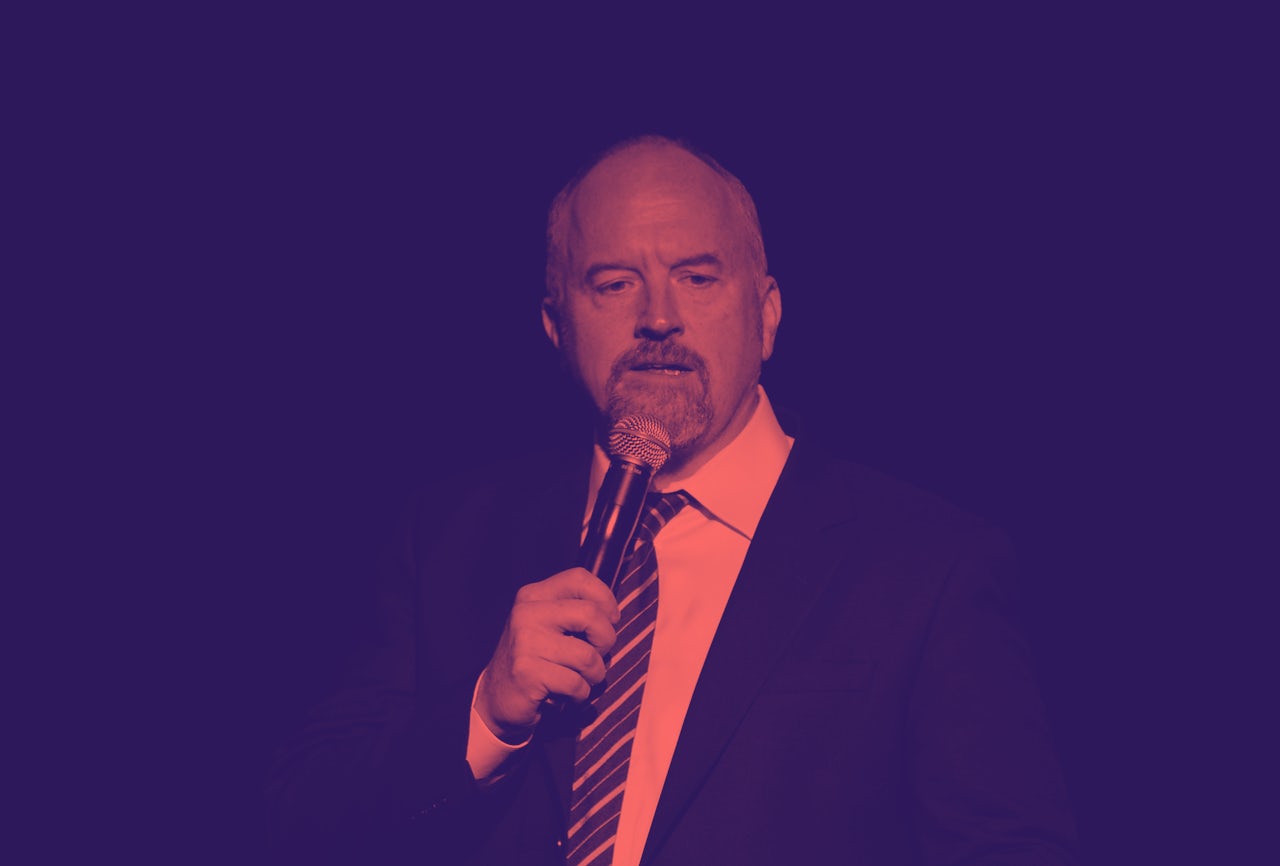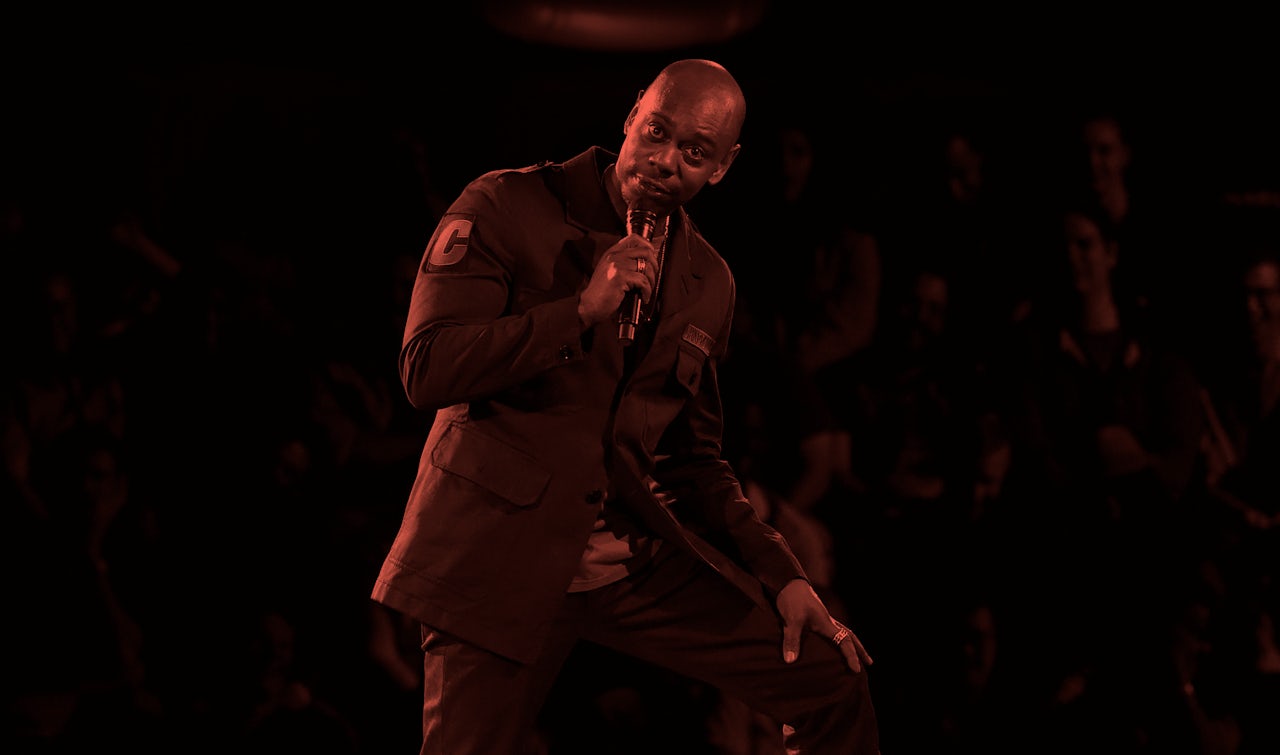The closest Louis C.K. comes to addressing Donald Trump during his latest stand-up special, Louis C.K. 2017, is in a joke about the film Magic Mike. He doesn’t mention Trump by name, but in an aside addressed to a hypothetical audience watching the special in the future, he explains that, “When things were really easy, we made movies like Magic Mike.” The crowd erupts with laughter (Louis C.K. 2017 was shot in Washington D.C. in January).
In the stand-up special, which was released last week on Netflix, the notoriously depressive Louis C.K. is perhaps at his most depressed. Instead of his standard uniform of a rumpled black T-shirt and jeans, C.K. wears a suit, his striped blazer mismatched with an opposingly striped tie. He was never particularly well-dressed (Ricky Gervais once described him as a “sweaty slob”). But here, his appearance isn’t unlike that of Trump, whose ill-fitting suits often express his discomfort as president. C.K. is certainly more famous now than he’s ever been, but the perks of that fame haven’t changed much for him. In close-up shots, you can see that his tie is crooked.
As he approaches 50 in a world where happiness feels untenable, C.K.’s trademark schtick — his ability to poke fun at the hypocrisy and banality of humanity — now seems particularly fraught. He steers clear of current events in the literal sense, but the comedian’s mind stays fixed on the abstract, unanswerable questions of our world, which today feel like the only questions left to consider. He addresses topics like abortion and the dominance of Christianity, all the while giving the impression that he’s trying to understand his own flaws.
One of his opening jokes is about suicide, which he posits as being the ultimate solution to every human problem. C.K. confesses that he’s thought about ending his life in the past, and laments therapists’ concern when they hear about such thoughts. He softens the blow by thinking it through with the audience, making a rather compelling, albeit crass, case against suicide. “I don’t love life. I like it just enough to not kill myself,” he says. “It’s a razor-thin margin.” A kind of dark didacticism has long been a hallmark of Louis C.K.’s standup; one of his most famous bits is a full-on exegesis about white people saying the phrase “the ‘N’ word.” Another is about what he describes as a “generation full of spoiled idiots”: “Everything is amazing right now and nobody’s happy,” he says. “When I was a kid, we had a rotary phone. We had a phone you had to stand next to, and you had to dial it.” C.K. implicates himself in all of these observations. And in his commitment to teasing out internal struggles as if they were a hilarious math problem, the show actualizes a cliché about comedians: that their work is in part a practice in much-needed self-treatment.
Louis C.K., whom I once considered an insightful, if absurd, philosopher, seems like too much of the wrong thing.
It can be difficult, especially when it comes to stand-up comedians, to separate the art from the individual. And in Louis C.K.’s case it is downright impossible. His observations about himself, the deeply hidden corners of his mind that many would be ashamed to share, are what can make his work so compelling. When he hosted SNL last week, C.K. described a quintessentially rich white guy problem in his monologue: being upset at an upscale hotel’s customer service. “It’s wrong that white people get preferential treatment. But as long as they do, what’s going on at this hotel? I’m supposed to get the best! Because I’m white! Which is awful and wrong ... but where is it right now?” he says. The joke works thanks to his self-awareness. Louis C.K. knows what he’s become, and he hates it too.
But what does that mean for his audience? We often look to comedians for philosophical advice or digestible interpretations of our current moment. (President Obama once quoted, and was later criticized for, a Chris Rock joke in a speech about race.) For fans of C.K., who has been accused on multiple occasions of sexual misconduct with women comedians, there are more pressing ethical quandaries and clear limitations of his endlessly cynical worldview. As the writer Vinson Cunningham pointed out in The New Yorker, “In Louis C.K. 2017, he acknowledges the fundamental absurdity of the standup’s recent designation as a purveyor of sociopolitical opinion. ‘Here’s what I think,’ he says, almost rolling his eyes at himself, as he eases into a finely parsed opening routine on abortion.”
Perhaps it is the fault of the modern age. Comedians like Louis C.K. and Dave Chappelle — whose similarly timely Netflix specials premiered last month — were seen as soothsayers once upon a time, able to vocalize their fans’ anxieties and make them laugh. Today, there seems to be a deficiency of such voices. Louis C.K., whom I once considered an insightful, if absurd, philosopher, seems like too much of the wrong thing. In the context of the current mood and with the knowledge that he might be a predatory person, his style betrays something darker than mere self-deprecating wit.
In the last joke of Louis C.K. 2017, he explains his “complicated relationship” with Magic Mike. He delivers a pitch perfect impression of Matthew Mcconaughey’s character in the film, admitting that the cast of supremely attractive men doing stripper routines stirs something in him. “I don’t really do impressions but I kinda nailed that one, because I think about it all the time,” he says. It’s funny, but you can’t help but squirm at the exposition, which concludes with him expressing his fear of gay sex. “I’ve never actually seen the end of Magic Mike, and I never will,” he says. “I’m pretty sure that the end of Magic Mike is that I’m gay.”
If we’re looking for existential clarity from comedians, maybe we’re asking them for too much.


